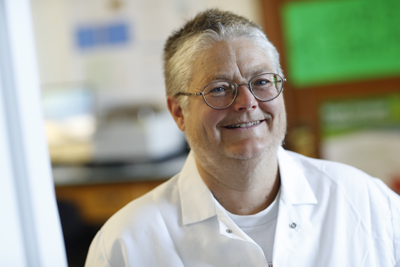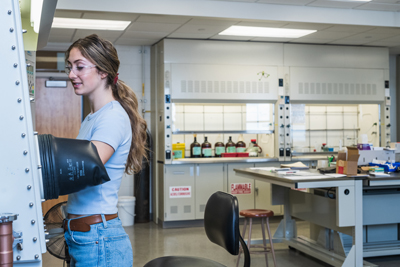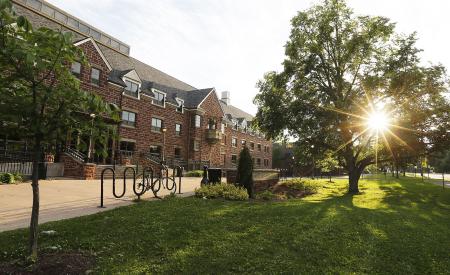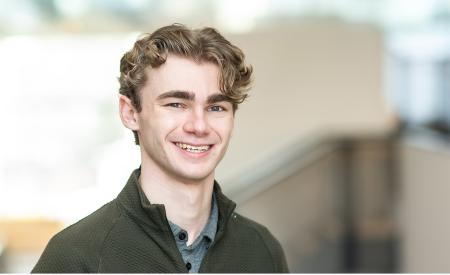Mount Allison researchers awarded funding for studies focused on COVID-19
SACKVILLE, NB – Two Mount Allison University professors, Dr. Vett Lloyd (biology) and Dr. Stephen Westcott (chemistry) are among a group of New Brunswick researchers who recently received funding in support of work focusing on COVID-19 research and recovery.
The New Brunswick Innovation Foundation (NBIF) in partnership with the New Brunswick Health Research Foundation (NBHRF) and the Atlantic Canada Opportunities Agency (ACOA) recently announced that 27 research projects across the province were awarded a total of $846,707 to explore new ways to detect and treat COVID-19 and to assess its effects on people, communities and the economy. Mount Allison projects received over $65,000 in funding for the new research.
“Both Dr. Lloyd and Dr. Westcott have well-established research programs and are leaders in their respective fields,” says Dr. Jeff Hennessy, Mount Allison’s Provost and Vice-President, Academic and Research. “I know their contributions to our understanding of COVID-19 will be valuable as we collectively navigate the pandemic.”
Dr. Lloyd’s project, Chronic complication of COVID-19, is seeking to learn more about the long-term health effects and potential  complications in patients who have had COVID-19. Drawing on the experiences of healthcare workers in Canada following the 2003 SARS outbreak who suffered long-term complications, Lloyd and her research team intend to track outcomes of infection in order to predict and prepare for the needs of recovering COVID-19 patients, and identify factors that trigger symptoms and may respond to treatment.
complications in patients who have had COVID-19. Drawing on the experiences of healthcare workers in Canada following the 2003 SARS outbreak who suffered long-term complications, Lloyd and her research team intend to track outcomes of infection in order to predict and prepare for the needs of recovering COVID-19 patients, and identify factors that trigger symptoms and may respond to treatment.
“Our project will look at the complications suffered by COVID-19 patients — some of whom don’t get fully better after the infection,” explains Lloyd. “Considering the widespread transmission of COVID-19, development of post-viral chronic illness in the population could have a devastating impact globally. We intend to track outcomes of infection in order to predict and prepare for the needs of recovering patients, and identify factors that trigger symptoms and may respond to treatment.”
Lloyd’s research is part of a multi-centre study with the other partners being the University Guelph and the Upper River Valley Hospital in Woodstock, NB. She is working with medical doctors, healthcare professionals, as well as Mount Allison students. Biology student Keeley Barnable is the Loewen Health Research Intern with the Upper River Valley Hospital while and Kiana Gagnon is working in Lloyd’s lab. She holds a Lyme network scholarship.
Mount Allison chemistry professor and Canada Research Chair in Green Boron Chemistry Dr. Stephen (Steve) Westcott will also be  focusing some of his current research on COVID-19 treatment and recovery. Westcott’s project, The fifth element: Battle COVID-19, in partnership with Ryerson University, will test many active compounds already studied by the Westcott lab for anti-viral properties, which could be key in the global fight against COVID-19. The team will also develop new compounds based on natural products such as capsaicin (the active ingredient in hot pepper chilies) and eugenol (found in nutmeg, cloves, basil and bay leaves). Boron pharmaceuticals have been found to have less-side effects and are considered to be green medicinal agents.
focusing some of his current research on COVID-19 treatment and recovery. Westcott’s project, The fifth element: Battle COVID-19, in partnership with Ryerson University, will test many active compounds already studied by the Westcott lab for anti-viral properties, which could be key in the global fight against COVID-19. The team will also develop new compounds based on natural products such as capsaicin (the active ingredient in hot pepper chilies) and eugenol (found in nutmeg, cloves, basil and bay leaves). Boron pharmaceuticals have been found to have less-side effects and are considered to be green medicinal agents.
“Our research program focuses on the development of new catalytic and non-catalytic methods of preparing potentially bioactive boron and metal compounds — which come from natural sources, such a many common plants and minerals,” explains Westcott.
“Many of the compounds we’ve tested have anti-fungal and anti-cancer properties. However, we have yet to test our compounds as potential anti-viral agents. This study will help determine if the use of our un-conventional compounds containing boron could potentially be used in the treatment of COVID-19.”
The Westcott research team, which includes several Mount Allison students, currently has over 300 compounds to send for testing. Researchers anticipate it will about a one year to generate the new family of natural product-based compounds.
Photo captions: Mount Allison biology professor Dr. Vett Lloyd. A student works in Dr. Steve Westcott’s lab on campus in this 2019 file photo.
Read the NBIF’s provincial announcement (July 16, 2020) at: https://nbif.ca/new-brunswick-researchers-rise-to-the-challenge-of-covid-19/




